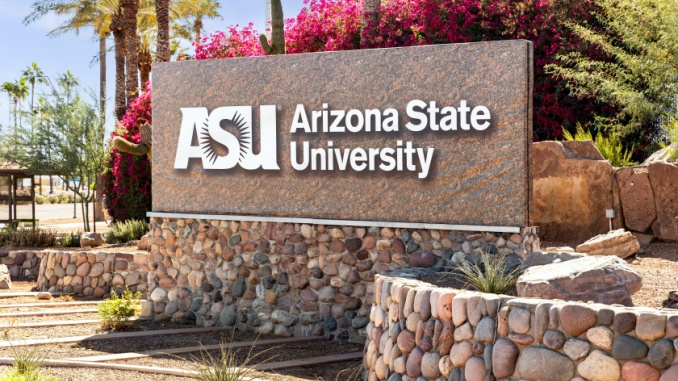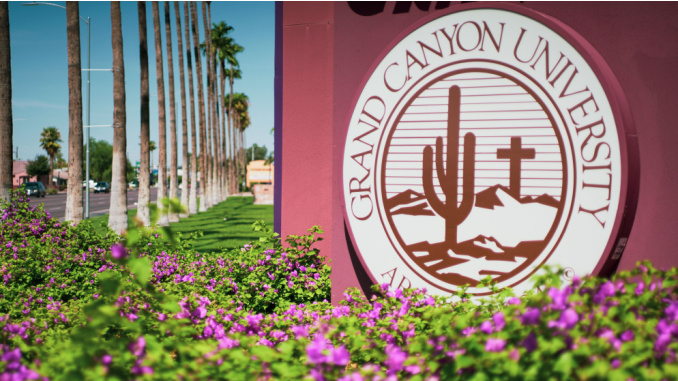
by Ethan Faverino | Aug 31, 2025 | Education, News
By Ethan Faverino |
Arizona Superintendent of Public Instruction Tom Horne criticized the lenient sentencing of Daniel Hollander. Hollander was arrested in January 2025 after breaking into Legacy Traditional School–East Tucson with a gun and knife, threatening to kill children and “make them famous.”
Hollander faced charges of attempted terrorism, interfering with an educational institution, weapons misconduct on school grounds, and burglary. He was sentenced to only 18 months in prison followed by probation, a punishment Horne deems inadequate to protect Arizona’s students.
Hollander’s arrest was made possible by the swift and courageous actions of Tucson police officer William Bonanno, a school safety officer funded through the Arizona Department of Education’s school safety program.
“We avoided that tragedy by the skin of our teeth,” said Superintendent Horne. “Tucson Police Officer William Bonanno was the safety officer on campus. He was hired just two weeks before the incident. He is experienced and brave, and after being alerted to a problem on campus, he checked an open door and found the would-be perpetrator with a gun and a knife. Because of his experience and courage, he did not wait for backup but immediately arrested the individual.”
In a statement following the sentencing in Pima County Superior Court, Horne expressed outrage at the prosecutor’s recommendation of just one year in prison and 10 years’ probation.
“As a former Attorney General, I know that the public is entitled to be protected from people like this defendant,” Horne stated. “The judge increased it to 18 months, but could not do more in view of the prosecutor’s recommendation. Probation is not perfect. If this individual has a bad day, he could go into a school and kill students. In my opinion, the prosecutor’s recommendation should have been at least 20 years in prison to protect our children.”
Horne emphasized his administration’s commitment to school safety, noting that the number of police officers in Arizona schools has risen from 190 to 585 over the past two years.
Just before the incident, the Arizona Department of Education identified unused funds and reopened grant opportunities, enabling the hiring of Officer Bonanno.
“I urge the schools to consider that a maniac could invade a school and kill 20 students, as has happened in other states, and could happen here. This is my worst nightmare,” said Horne.
Horne’s administration remains dedicated to strengthening school safety measures to protect Arizona’s students from threats like these.
Ethan Faverino is a reporter for AZ Free News. You can send him news tips using this link.

by Matthew Holloway | Aug 30, 2025 | Education, News
By Matthew Holloway |
Arizona State University’s online component, ASU Online, has partnered with several California community colleges to launch a new pilot program. The initiative allows California online undergraduates and alumni to save 22% on tuition—about $130 less per credit hour than Arizona residents pay.
According to a press release issued by ASU Online, the special rate for California students comes “with no income requirements or special applications needed to receive the special tuition.”
The release added that “the pilot program helps break financial barriers and creates an accessible, seamless transfer pathway for California residents to complete a degree.”
“Our university is committed to enhancing access to high-quality education for all students capable of college-level work,” ASU President Michael Crow said in a statement. “Providing top online learning opportunities and making ASU’s world-class faculty available to the enthusiastic learners in our neighboring state will prepare more skilled graduates, strengthen our shared region and support a better future.”
In a post to X, ASU Online posted enthusiastically, “Big news! Students & alumni of our California Community College partners can now transfer to @ASUOnline and save 22% on tuition through the California Community College Achievement Plan! Who’s ready to finish their degree?”
The emphasis on the educational outcome of California students and the substantial discount being offered under the pilot program is striking given that the Arizona Board of Regents 2021 Financial Aid Report (the most recent available) found that 55 percent of undergraduates from ASU, 55 percent from NAU, and 47 percent from UArizona graduated in debt. The report explained that “the average debt load at graduation was $24,447 at ASU; $21,461 at NAU; and $25,343 at UArizona.” According to the Board, approximately 4.5% of ASU students are defaulting on their loans.
ASU reported in the release that it currently has approximately 15,000 California students enrolled online. Anecdotally, citing one alum’s story, they claim that these students are “making meaningful contributions to the state’s economy,” specifically California’s economy, not Arizona’s.
AZ Free News has reached out to Speaker of the Arizona House of Representatives Steve Montenegro, who sits ex officio on the Joint Legislative Auditing Committee (JLAC), which has legislative oversight over ASU, the Arizona Board of Regents, and the Superintendent of Public Instruction, Tom Horne. No comments were received before filing this story.
Matthew Holloway is a senior reporter for AZ Free News. Follow him on X for his latest stories, or email tips to Matthew@azfreenews.com.

by Matthew Holloway | Aug 29, 2025 | Education, News
By Matthew Holloway |
Arizona Superintendent of Public Instruction Tom Horne weighed in on the scandal involving Cartwright Elementary School District board members Lydia and Cassandra Hernandez. The mother-daughter duo allegedly tried to smuggle a box-cutter style knife into Maryvale High School just days after a fatal stabbing there claimed the life of a 16-year-old student. Horne called for both women to resign their public offices immediately.
As reported by Fox10, Officials with the Phoenix Union High School District (PXU) told the outlet that on August 25th, Arizona State Rep. Lydia Hernandez (D-LD24) and her daughter, Cassandra Hernandez, created a disturbance at Maryvale High School by “knowingly bringing an unauthorized weapon onto campus.” Lydia Hernandez denied the school district’s accusation in response to an inquiry from Fox10 but declined to comment further.
PXU confirmed in a statement that the two women were “attempting to circumvent our safety systems and knowingly bringing an unauthorized weapon onto campus.”
The district stated in its announcement, “We will pursue all legal options, including pressing charges and trespassing the individuals from coming back to our campuses.”
Both women were recording the incident on their phones. At that point, “Lydia told the staff that she was video recording the interaction and that she was testing the weapon detection systems,” PXU said in a news release. Both women were then escorted from the premises.
Arizona SPI Horne released a statement condemning the women for the incident, saying, “This was an outrageous and indefensible stunt. For two school board members, one who is also a state legislator, to deliberately provoke a security disruption at a school is unconscionable. To do it at Maryvale High School where a student was tragically murdered in a classroom just a week earlier is unbelievably insensitive to the trauma that was inflicted on the students, teachers and staff of that school. These two board members should resign immediately.”
Horne continued, “The safety of our campuses is an absolute priority. Security personnel and safety officers need to do their jobs, and they cannot be diverted from protecting the campus by a juvenile and unnecessary act such as this. The actions of these board members show they do not appreciate the seriousness of ensuring campuses are safe places and the Cartwright Board must include members who are committed to school safety.”
Phoenix City Councilmembers Betty Guardado and Anna Hernandez released a joint statement similarly calling for both women to resign, according to KTAR.
“Their actions disrupted the fragile environment at Maryvale High School, were a blatant disregard for safety and school protocol, and were gravely insensitive to the students, families, and school staff still mourning the Maryvale student who died last week,” Guardado and Hernandez said. “The choice to target a school still reeling from trauma speaks volumes about their judgment and priorities as leaders. Such actions jeopardize the safety of students and staff alike, showing an alarming lack of responsibility and failure as public officials.”
Arizona House Democrat Leaders reacted with a statement saying, “The incident spelled out in the School District’s statement is serious and shocking.” The Democrat leaders noted that while they have “not yet had an opportunity to speak with Rep. Hernandez to get an explanation from her perspective…it should go without saying that nobody — elected official or otherwise — should engage in such reckless and potentially criminal behavior on a school campus.”
Matthew Holloway is a senior reporter for AZ Free News. Follow him on X for his latest stories, or email tips to Matthew@azfreenews.com.

by Matthew Holloway | Aug 27, 2025 | Education, News
By Matthew Holloway |
Former University of Arizona (U of A) ethics professor Daniel Grossenbach is suing the school with the help of Liberty Counsel, after being fired for publicly advocating for his parental rights at Catalina Foothills School District (CFSD) meetings.
Grossenbach, a CFSD parent and resident, is the founding member of ‘Save CFSD,’ a “non-profit organization focused on educating parents about school board policies and issues and fundamental parental rights.” According to the lawsuit, he was “unceremoniously terminated” by U of A leaders, “at the demands of internet trolls’ intent on silencing his speech.”
In a press release issued Friday, Liberty Counsel announced the lawsuit on Grossenbach’s behalf. The Christian legal ministry explained, “In 2023, Grossenbach spoke several times at school board meetings, which [were] attended by hundreds of concerned parents, and delivered two-to-three-minute, pre-written speeches. He routinely included a disclaimer that he spoke for himself and not for his employer, and expressed without hate, slander, or violence how the district’s policies violated parental rights.
“The lawsuit then states that ‘anti-religious zealots turned digital critics’ coordinated over social media to silence Grossenbach and SaveCFSD by getting him fired from his job. Subsequently, numerous anonymous complaints were filed against him with the University of Arizona encouraging the university to discipline him for speaking out about his rights and beliefs.”
Liberty Counsel revealed, “In November 2023, the university informed him that it would not be renewing his part-time teaching contract for the following Spring ethics courses citing it had received funding for a full-time faculty member. However, the university never hired a full-time professor nor offered his ethics course the following Spring. In fact, the university posted advertisements soliciting resumes for additional part-time professors meeting Grossenbach’s exact skills and experience to teach similar courses he had been teaching for years.”
The attorneys argue that despite Grossenbach’s good performance and positive reputation, U of A terminated his employment “after discovering that he was an outspoken Christian advocating for change within his local school board to protect his family.” They claim the university subsequently stalled the disclosure of public records regarding his termination for 239 days in violation of Arizona law.
“[The University of Arizona’s] actions have inflicted irreparable damage to Professor Grossenbach’s professional career and reputation, ended his academic pursuit of a doctorate degree, decreased his earning potential, and reduced his income,” wrote Liberty Counsel. “Further, when Professor Grossenbach was terminated, he lost a potential textbook publishing deal, furthering his financial loss and reputational damage.”
According to the lawsuit, Grossenbach was terminated on November 30, 2024, after serving in his role for over three years “on the basis of complaints lodged by anonymous online censors targeting his constitutionally protected speech regarding his sincerely held religious beliefs, in his private capacity, separate and apart from the workplace.”
The professor filed a charge of discrimination with the Equal Employment Opportunity Commission and obtained a Notice of Right to Sue on May 25, 2025.
“Professors at public universities and colleges do not shed their constitutional rights to free speech and religious exercise when they work for a university,” said Liberty Counsel Founder and Chairman Mat Staver. “Professor Daniel Grossenbach engaged in constitutionally protected speech, religious expression, and religious exercise and was speaking on matters of public concern regarding his faith, morality, and the community. The University of Arizona cannot fire a professor for his protected speech. Viewpoint discrimination is unlawful and violates the First Amendment and religious discrimination violates Title VII.”
Liberty Counsel is seeking a permanent injunction to declare the university’s Nondiscriminatory and Anti-Harassment Policy and Statement of Professional Conduct illegal and unlawful, along with compelling U of A “to reasonably accommodate the religious beliefs and practices of its employees.” The lawsuit also asks the court to reinstate Grossenbach to his former position, restore his benefits, and award damages.
Grossenbach’s efforts with ‘Save CFSD’ and exposure of controversial whistleblower audio released in May have been reported on by AZ Free News. The Professor also penned an op-ed on AZ Free News in October 2024 discussing his termination.
Matthew Holloway is a senior reporter for AZ Free News. Follow him on X for his latest stories, or email tips to Matthew@azfreenews.com.

by Matthew Holloway | Aug 23, 2025 | Education, News
By Matthew Holloway |
Controversy has once again embroiled Arizona State University (ASU), threatening the credibility of the institution, Arizona PBS, and the Walter Cronkite School of Journalism. Emails uncovered by the Arizona Republic reveal that ASU President Michael Crow, former Arizona Republic publisher Mi-Ai Parrish, and other officials allegedly favored Democratic gubernatorial candidate Katie Hobbs over Republican Kari Lake during the 2022 Arizona gubernatorial election.
Lake has accused them of “collud[ing] to prevent me from having a debate forum.”
Reporting from the Arizona Republic’s Stacey Barchenger earlier this month exposed internal discussions among ASU leadership that appeared to prioritize Hobbs while sidelining Lake. The emails, obtained through public records requests, show that Parrish emailed Arizona PBS leaders, writing, “We may have issues,” after discussions with PBS Senior Director of Content, Ebonye Delaney. They expressed concerns about equal time laws and the risk to ASU’s relationship with the Arizona Citizens Clean Elections Commission.
Crow emailed Parrish, stating, “Whatever the format there remains the fact that it is our venue and brand. We need structure…and format…….and….people who believe in elections as participants.” He later instructed his chief of staff, James O’Brien, and Parrish to “make sure you are both on the same page here,” prompting Parrish to ask, “What outcome are you seeking?”
ASU offered Hobbs a solo interview on Arizona PBS, a move that severed the university’s long-standing partnership with the voter-approved Clean Elections Commission. This decision was influenced by Crow’s reported disagreement with Lake’s views on election integrity and his labeling her an “election denier.”
Barchenger’s report, citing expert opinions, stated “That ASU leaders would consider one candidate’s views, and then reach down and influence television programming, called into question Arizona PBS’ independence as a news organization and its autonomy from university influence, experts said.”
“And it could have risked legal repercussions for Arizona’s largest university, they added.”
The Arizona Republic’s Robert Anglen shared the findings on X, writing, “Newly released emails detail how ASU’s top leaders sought to muzzle Kari Lake in 2022 for her election-denial views and give preferential treatment to Katie Hobbs on Arizona PBS during the governor’s race.”
Lake rejected Arizona PBS’s offer of a 30-minute solo interview, insisting on a joint debate with Hobbs. She told reporters at the time, “If she doesn’t appear with me, they should kick her out. If Democrats don’t have to sit on the debate stage with the Republicans, if they can just stomp their feet and demand a safe space … then we’ll never have a debate system again.” Lake instead participated in a Clean Elections-sponsored interview on another station and vowed to avoid PBS-related events.
In a statement responding to the exposé, Lake said: “Taxpayer-funded Michael Crow and taxpayer-funded ASU, along with taxpayer-funded PBS, colluded to prevent me from having a debate forum for fear I would talk about election fraud, and because their chosen candidate Katie Hobbs would’ve been destroyed in a debate with me. They interfered in the 2022 Arizona Gubernatorial election and trampled on my First Amendment rights. Their actions were not just unethical; they were likely illegal, too.”
ASU spokesman Jay Thorne defended the university’s actions, however, stating, “The shared objective of ASU and Arizona PBS after the gubernatorial debate was cancelled was to provide a forum for the voters of Arizona to hear from the two candidates for Governor in an interview format. It was an opportunity provided under identical conditions to each candidate, and only one accepted the offer.”
The controversy has raised serious questions about Arizona PBS’s journalistic independence and ASU’s impartiality. Crow, who received a contract extension with a pay raise and bonuses in 2024 despite prior scandals, faces renewed scrutiny over allegations of partisan interference in the electoral process. The decision to prioritize one candidate’s platform over another has sparked outrage and could have lasting repercussions for the institutions involved. This rewritten version organizes the information into clear sections, eliminates redundancy, and enhances readability while preserving all original quotes.
The Arizona Free Enterprise Club (AZFEC) announced August 20th that it has filed a Hatch Act complaint against ASU “for using taxpayer-funded resources to meddle in the 2022 Governor’s race.”
Scot Mussi, President of AZFEC, stated, “This was a blatant misuse of taxpayer-funded university resources to tilt the scales of a gubernatorial election. Arizona law is clear: universities must remain impartial and neutral in election-related activities.”
Matthew Holloway is a senior reporter for AZ Free News. Follow him on X for his latest stories, or email tips to Matthew@azfreenews.com.

by Ethan Faverino | Aug 20, 2025 | Education, News
By Ethan Faverino |
In a unanimous decision, the Federal Trade Commission (FTC) has dismissed its lawsuit against Grand Canyon University (GCU) and its CEO, Brian Mueller, bringing an end to years of coordinated lawfare by former Biden administration officials targeting the university.
The lawsuit, previously dismissed by the United States District Court of Arizona on jurisdictional grounds, was fully resolved through a joint Stipulation of Dismissal with Prejudice.
FTC Chairman Andrew Ferguson, joined by Commissioners Melissa Holyoak and Mark Meador, issued a statement citing recent developments that influenced the decision.
The statement reads:
“This case, which we inherited from the previous administration, was filed nearly two years ago and has suffered losses in two motions to dismiss. These losses are compounded by recent events: Grand Canyon secured a victory over the Department of Education in a related matter before the Ninth Circuit; the Department of Education rescinded a massive fine levied on related grounds; and the Internal Revenue Service confirmed that Grand Canyon University is properly claiming 501(c)(3) non-profit corporation designation. In its reduced form, this case presents consumers very little upside relative to the cost of pursuing it to completion, especially given the developments chronicled above. We view it as imprudent to continue expending Commission resources on a lost cause. Because we have a duty to maximize consumers’ return on their tax-dollars investment, we have decided against pursuing this matter any further.”
GCU President Brian Mueller expressed gratitude for the FTC’s objective review, noting that multiple agencies and courts have consistently ruled in GCU’s favor.
“They threw everything they had at us for four years, and yet, despite every unjust accusation leveled against us, we have not only survived but have continued to thrive as a university,” President Mueller said. “That is a testament, first and foremost, to the strength and dedication of our faculty, staff, students, and their families. Above all, it speaks to our unwavering belief that the truth would ultimately prevail.”
The FTC lawsuit was part of a broader, coordinated campaign by former Biden administration officials, including the Department of Education (ED) and the Department of Veterans Affairs (VA), to target GCU with duplicative investigations and lawsuits.
Ethan Faverino is a reporter for AZ Free News. You can send him news tips using this link.






